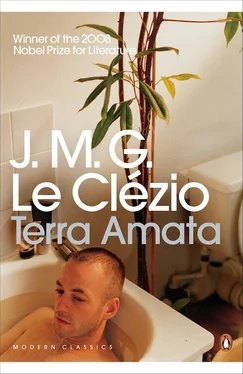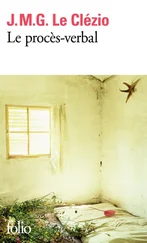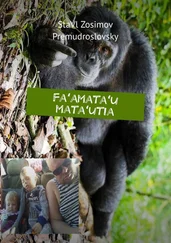The sky is shrouded, lightning suddenly tears the dark clouds, big drops of rain begin to fall: it is she. In the blackberry thicket a thorn suddenly pierces a finger, adding to the pearl of blood a whitlow germ: it is she, it is still she. On the grey trees the fruit swells and hangs heavily from the branches: it is she in each orange, each lemon, each medlar. On the motor-way the tar melts in the sun and the cars stop, their radiators boiling. It is she. Beauty.
So that was what that landscape was like — there on that piece of earth facing the sea, beneath the naked sky, with at night the moon and stars, and in the day the solitary stare of Kax, the sun.
Bare as a drawing by a four-year-old, reduced to the essentials: a horizontal line, a tree as tall as a tower, a house with a pointed roof, and, in a sky divided into squares, on the right a kind of shining grasshopper and all over the rest, scribbled huggermugger and indistinct, the spirals of the stars, the zigzags of the birds, the patches of cloud and the discs of jet-planes and flying saucers. It was the simplest of places. There was no country in the world but it. It was as if you had been alive for ever, hidden somewhere, for centuries and centuries, drawn in one corner, scribbled down just like the others. Yes, you’d always been there, with all the rest of them, with Kax, with Maa the sea, with Manuel, Kalar, Azor, Gélo, Silicoe, Prixt, Gaur, Tony and Amadeus. With the tarantulas Brux and Géochs, with Nathan the crab and Fueco the salamander. With Bryant the cockroach and Alex the caterpillar. With the cockchafer Go.
A few letters had been written higgledy-piggledy, spelling your own name: CHANCELADE.
The little boy whose name was Chancelade was sitting in the sun outside the old house. He wore a pair of cotton trousers and a red shirt, and his feet were bare. On his right wrist was a toy plastic watch with the hands pointing to half-past twelve. But no one could have said what the real time was. He was sitting on the second of the steps up to the door, picking his nose.
It was the beginning of summer, or autumn. The sun shone motionless in the middle of a grey-blue sky. The trees stood peacefully in the earth, and the wind blew through their leaves with the sound of falling rain. In front of the red-brick house was a sort of fallow garden bounded left and right by a bamboo hedge and at the end by a stream that served as a drain. It wasn’t a very big garden, but it had lots of plants and grasses. A few trees too here and there. Two very tall palm-trees with ivy round their trunks. An orange and a lemon, both stunted. A cherry-tree with a big white gash full of ants. A medlar, a laurel, and a mandarin. In the middle of the garden, surrounded by a border of pebbles, an olive spread its ample branches in every direction. All around it little bushes sprang up out of the grass where the olives had fallen, rotted, then sprouted. And right at the bottom of the garden, by the evil-smelling stream, was the eucalyptus. It was very tall, with smooth trunk and sickle-shaped leaves, and it gave off a slow stale smell and rustled in the wind. It must have been between seventy and a hundred and twenty years old.
The boy walked about in the grass for a few minutes, careful where he put his feet because of the scorpions. Then he went back and sat on the same step again and began as usual to play with the potato-bugs.
Potato-bugs were running about all over the grass and on the concrete path below the steps. There were dozens, perhaps hundreds of them, coming and going in all directions, stopping, starting again, trying to climb the walls and falling back defeated. They were all the same, with a black head, finely curved black legs, black feelers, and a body covered in red and black stripes that shone in the sun. They didn’t go about in ordered caravans like ants, but helter-skelter, each searching separately for something he could never find, going over the same ground ten times, bumping into one another, groping at one another, never weary. Chancelade watched them for a long while from his step, not thinking. Every now and then one of them would climb on to the ankles of his trousers or on to his toes, and then he would lift them off gently and toss them back on to the grass.
It could have gone on like that for hours. You could have stayed there for hours watching them teem over the concrete path. Or if you liked you could have tried to follow just one, that one for example, the one that’s just emerged from a tuft of grass and begun to walk over the concrete. He hurries along two bandy legs at a time. He passes another bug going in the opposite direction, then another. He doesn’t even see them. He overtakes a potato-bug standing still, then turns round and goes back past it again. He turns to the right and goes towards a little heap of sand that someone must have emptied out of their beach-shoes. He goes round it to the left. Stops. Comes back. Meets three other potato-bugs walking round the heap of sand. Stops. Feels the antennae of the first potato-bug. Feels the antennae of the second potato-bug. Feels the back of the third potato-bug. The path’s clear: off he goes again. He turns about and starts going round the heap of sand again to the left. Another potato-bug. Two. Three. Four. He goes over a twig that moves slightly as he does so. He stops. Starts again. Goes very fast. Turns to the right and heads for the wall. Meets one potato-bug. Overtakes another. Walks without noticing over a group of Argentine ants and scatters them. Comes to a scrap of rotten cardboard. Stops. Feels it with his antennae. Tries to stand on his hind legs and climb over it. But the cardboard moves and he gives up. Then he goes off the way he came, but more slowly now. Goes past a group of three potato-bugs standing facing one another. Turns left, right, left, right again then left again. He crosses the groove in the path. Stops. Stays still for four or five seconds, then goes off again as fast as he can, fleeing some incomprehensible danger. He clambers over another twig, passes another potato-bug. He makes straight for a fly but just as he’s about to hit it it takes off. He overtakes one potato-bug on the right and another on the left. He changes direction and goes back towards the wall. When he reaches the foot of it he runs along towards the steps. Every so often he stops, turns towards the wall and tries to climb it. But he hasn’t got the strength. Then he holds his feelers out towards the garden, trying to see what’s happening in those layers of air where the misty unknown peacefully pulsates.
You could amuse yourself watching him for hours, inch by inch, every moment of his vain excursion. Or you could take another potato-bug, for instance the one pacing along the edge of the path next to the garden. Or the one that’s climbed right up the geranium stalk, or again the one that’s just standing still in the middle of the patch of concrete waiting for heaven knows what.
You could follow every one of them, each with its life, its microscopic adventures, its heart, eyes, feelers, intestines, sex-organs, and its red-and-black-striped back. And you too had your life, closed in and warm, as if somewhere there were someone sitting on some huge steps, looking down and watching you without thinking.
When the boy realized that he was the potato-bugs’ god, with absolute power of life and death over them, he decided to act.
He slid down and sat on the bottom step. Then with his right foot he pulled the iron footscraper towards him. He picked up the metal grille then put it down again to mark out the limits of his kingdom. The interstices of the bars formed thirty little separate cells. Chancelade bent down beside it, collected thirty potato-bugs, and arranged them one in each cell. When all the holes were occupied he knelt on the ground and saw what he had made; and behold, it was very good. Inside the metal enclosures the potato-bugs were all struggling to escape, putting their front feet on the iron and trying to hoist themselves up. But after a few seconds they all dropped back: they were too heavy and their feet slipped on the metal. Some even fell on their backs and made desperate efforts to right themselves, waving all their legs, their brown bellies exposed. The boy helped them up with the tip of his finger, but no sooner were they on their feet than they started trying to climb the walls of their cells again.
Читать дальше












